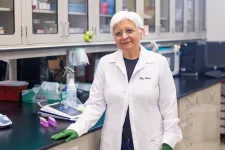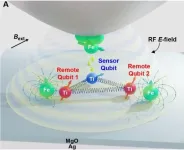(Press-News.org) University of Birmingham News Release
STRICTLY EMBARGOED UNTIL 14.00 Thursday 5th October ET 2023/ 19.00 Thursday 5th October UK 2023
Researchers have identified a ‘guard mechanism’ for a protein which attacks microbes in infected cells, opening the possibility of new treatments for Toxoplasma, Chlamydia, Tuberculosis and even cancer.
A study, led by the University of Birmingham and published today (5th October) in Science has discovered the lock and key mechanism that controls the attack protein GPB1. GBP1 is activated during inflammation and has the potential to attack membranes within cells and destroy them.
The research has revealed how the attack protein is controlled through a process called phosphorylation, a process in which a phosphate group is added to a protein by enzymes called protein kinases. The kinase targeting GBP1 is called PIM1 and can also become activated during inflammation. Phosphorylated GBP1 in turn is bound to a scaffold protein, which keeps uninfected bystander cells safe from uncontrolled GBP1 membrane attack and cell death.
The newly discovered mechanism prevents GPB1 from attacking cell membranes indiscriminately, creating a guard mechanism that is sensitive to disruption by the actions of pathogens inside the cells. The new discovery was made by Daniel Fisch, a former PhD student in the Frickel lab working on the study.
Dr Daniel Fisch said: “This was a fantastic project to work on for the past six years and involved many research groups from all over the world. None of this would have been possible without help from our colleagues and friends at The Francis Crick Institute in London, EMBL in Grenoble (France), ETH Zurich (Switzerland) and Osaka University (Japan).”
Dr Eva Frickel, Senior Wellcome Trust Fellow at the University of Birmingham, who led the study explained: “This discovery is significant for several reasons. Firstly, guard mechanisms such as the one that controls GBP1 were known to exist in plant biology, but less so in mammals. Think of it as a lock and key system. GPB1 wants to go out and attack cellular membranes, but PIM1 is the key meaning GPB1 is locked safely away.“
“The second reason is that this discovery could have multiple therapeutic applications. Now we know how GBP1 is controlled, we can explore ways to switch this function on and off at will, using it to kill pathogens.”
Dr Frickel and her team conducted this initial research on Toxoplasma gondii, a single-celled parasite that is common in cats. Whilst Toxoplasma infections in Europe and Western countries are unlikely to cause serious illness, in South American countries it can cause reoccurring eye infections and blindness and is particularly dangerous for pregnant women.
The researchers found that Toxoplasma blocks inflammatory signalling within cells, preventing PIM1 from being produced, meaning that the “lock and key” system disappears, liberating GBP1 to attack the parasite. Switching PIM1 ‘off’ with an inhibitor or by manipulating the cell’s genome also resulted in GPB1 attacking Toxoplasma and removing the infected cells.
Dr Frickel continued: “This mechanism could also work on other pathogens, such as Chlamydia, Mycobacterium tuberculosis, and Staphylococcus all major disease-causing pathogens which are increasingly becoming more resistant to antibiotics. By controlling the guard mechanism, we could use the attack protein to eliminate the pathogens in the body. We have already begun looking at this opportunity to see if we are able to replicate what we saw in our Toxoplasma experiments. We are also incredibly excited about how this could be used to kill cancer cells.”
PIM1 is a key molecule in the survival of cancer cells, while GPB1 is activated by the inflammatory effect of cancer. The researchers think that by blocking the interaction between PIM1 and GPB1 they could specifically eliminate cancer cells.
Dr Frickel said: “The implication for cancer treatment is huge. We think this guard mechanism is active in cancer cells, so the next step is to explore this and see if we can block the guard and selectively eliminate cancer cells. There is an inhibitor on the market which we used to disrupt PIM1 and GPB1 interaction. So, if this works, you could use this drug to unlock GPB1 and attack the cancer cells. There is still a very long way to go, but the discovery of the PIM1 guard mechanism could be a massive first step in finding new ways to treat cancer and increasingly antibiotic-resistant pathogens.”
ENDS
END
Researchers at Tulane University have shown for the first time that mothers are much less likely to transmit a common virus known to cause miscarriages and birth defects if they are exposed to the virus prior to becoming pregnant. The study marks a significant step toward the development of a vaccine that could protect mothers and their babies.
Cytomegalovirus (CMV) is a common herpesvirus that most women contract unknowingly before reaching child-bearing age. It's usually harmless except during pregnancy when, if passed on to the developing fetus, it is a leading cause ...
Seoul, Korea - Researchers at the IBS Center for Quantum Nanoscience (QNS) at Ewha Womans University have accomplished a groundbreaking step forward in quantum information science. In partnership with teams from Japan, Spain, and the US, they created a novel electron-spin qubit platform, assembled atom-by-atom on a surface. This breakthrough was published in the journal Science on 2023/10/06.
Unlike previous atomic quantum devices on surfaces where only a single qubit could be controlled, the researchers at QNS successfully demonstrated the ability to control multiple qubits simultaneously, enabling the application of single-, two-, and three-qubit gates.
Qubits, ...
Francis Crick Institute press release
Under strict embargo: 19:00hrs BST Thursday 5 October 2023
Peer reviewed
Experimental study
Animals
Researchers at the Francis Crick Institute have shown that pregnancy hormones ‘rewire’ the brain to prepare mice for motherhood.
Their findings, published today in Science, show that both oestrogen and progesterone act on a small population of neurons in the brain to switch on parental behaviour even before offspring arrive. These adaptations resulted in stronger and more selective responses to pups.
It is well known that while virgin female rodents do not show much interaction with pups, ...
A person’s immune response to variants of SARS-CoV-2, the virus that causes COVID-19, depends on their previous exposure – and differences in the focus of immune responses will help scientists understand how to optimise vaccines in the future to provide broad protection.
A new study has found that people differ in how vulnerable they are to different mutations in emerging variants of SARS-CoV-2.
This is because the variant of SARS-CoV-2 a person was first exposed to determines how well their immune system responds to different parts of the virus, and how protected they are against other variants.
It also means that the same COVID-19 ...
Scientists testing a new method of sequencing single cells have unexpectedly changed our understanding of the rules of genetics.
The genome of a protist has revealed a seemingly unique divergence in the DNA code signalling the end of a gene, suggesting the need for further research to better understand this group of diverse organisms.
Dr Jamie McGowan, a postdoctoral scientist at the Earlham Institute, analysed the genome sequence of a microscopic organism - a protist – isolated from a freshwater pond at Oxford University Parks.
The work was intended to test a DNA ...
TORONTO (5 October 2023) – Conscience, a game-changing non-profit venture focused on enabling drug discoveries for diseases that have received limited attention from the pharmaceutical industry, launched today with pioneering support from the Canadian government.
With CA$105.7 million in funding, including $49 million from the Canadian government and the engagement of industry, academia, government and patient advocacy groups, Conscience seeks to lead global drug discovery and development for emerging, rare or complex ...
In 1913, historian of science George Sarton created what has become the Isis Current Bibliography of the History of Science (IsisCB). For the last 110 years, the journal Isis has included a comprehensive survey of the recent work in the history of science and allied fields, first in each issue and later as a full yearly supplement. Now the basis of a free online search tool called IsisCB Explore, the IsisCB continues to serve as an indispensable reference for scholars and students.
“Bibliographic ...
CLEVELAND—A pair of theoretical physicists are reporting that the same observations inspiring the hunt for a ninth planet might instead be evidence within the solar system of a modified law of gravity originally developed to understand the rotation of galaxies.
Researchers Harsh Mathur, a professor of physics at Case Western Reserve University, and Katherine Brown, an associate professor of physics at Hamilton College, made the assertion after studying the effect the Milky Way galaxy would have on objects in the outer solar system—if the laws of gravity were governed by a theory known as Modified ...
The past decade has seen a significant increase in marijuana use among U.S. college students. This increase has coincided with notable changes in national and local cannabis laws and policies, and perceptions of the associated drug’s risk over the same period. However, cannabis use by students continues to be a public health challenge throughout the country. Universities have long relied on education programs to address these risks; however, many of these programs have limitations and fail to consider some of the modern risk factors ...
NEW YORK, NY (October 5, 2023) – Researchers have used CRISPR gene editing, stem cells and human neurons to study the impact of a gene that is commonly mutated in autism. This new study, published today in The American Journal of Human Genetics, ties mutations in the gene CHD8 with a broad spectrum of molecular and cellular defects in human cortical neurons.
Autism is a highly heritable disorder with a recent increase in incidence — approximately 1 in 40 children in the US are diagnosed with autism. Over the past decade, sequencing studies have found many ...


